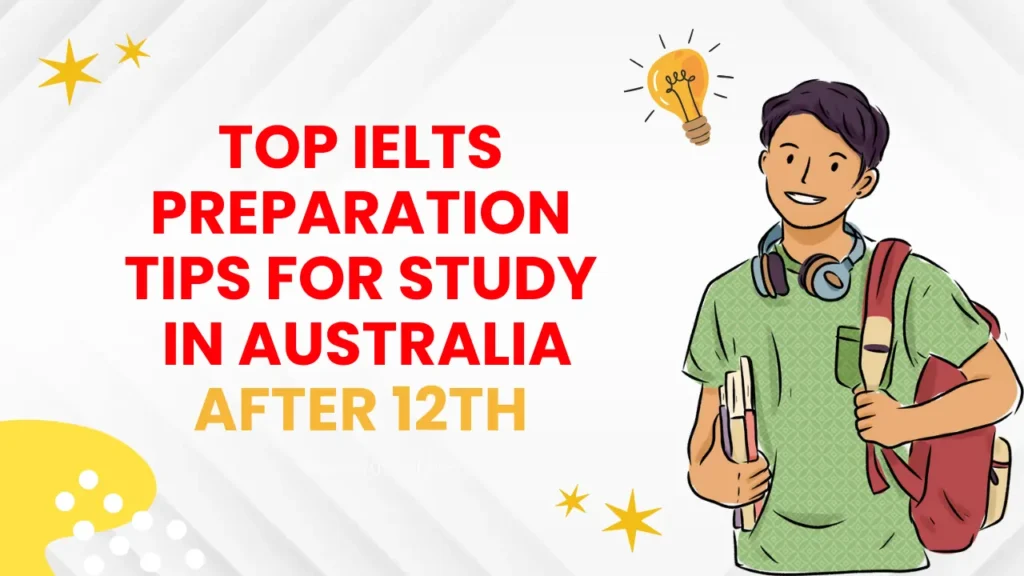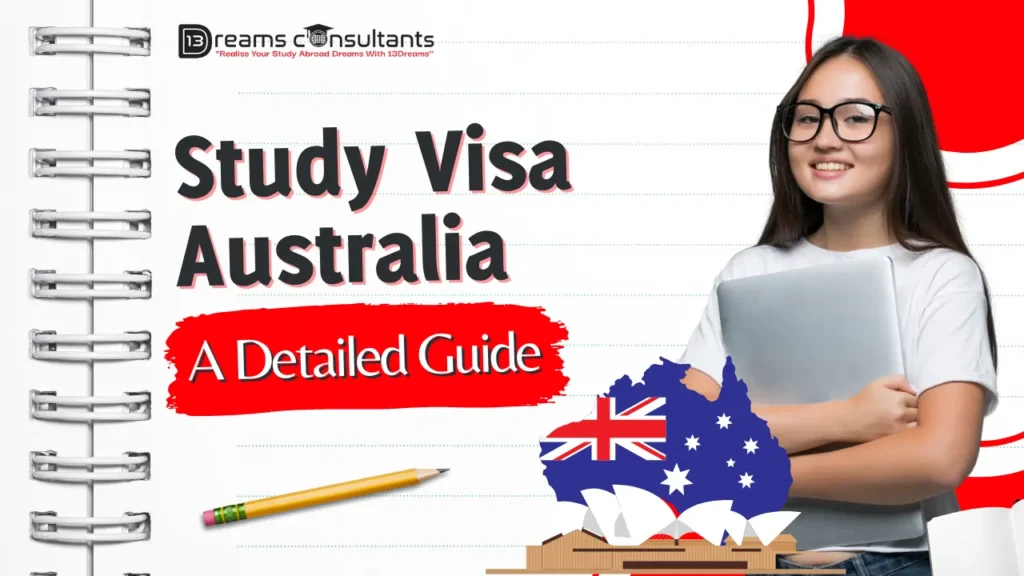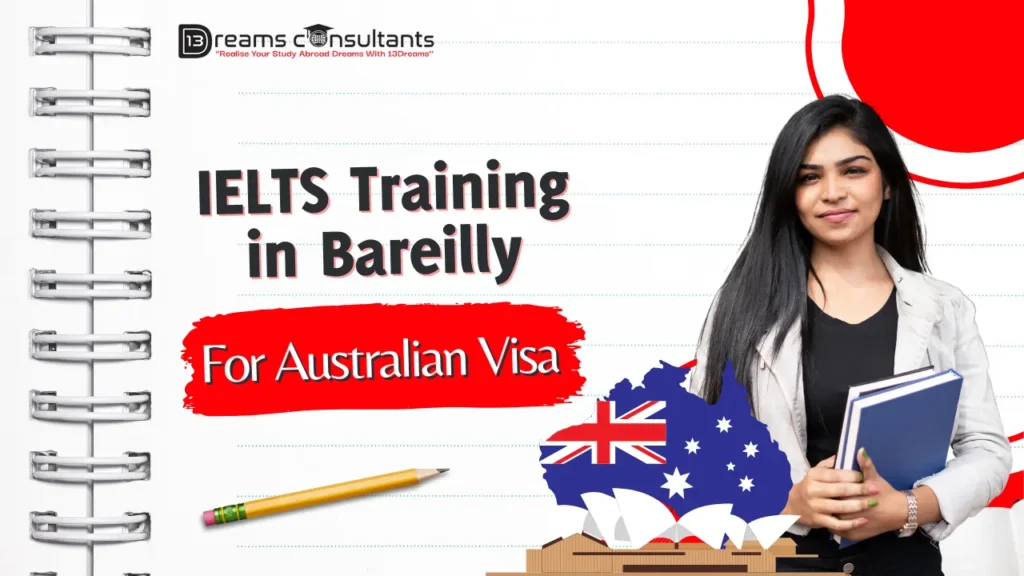Australia is a top study abroad destination for Indian students looking to pursue higher education after finishing 12th grade. With a world-class education system, cultural diversity, excellent post-study work opportunities and high standard of living, over 100,000 international students choose Australia every year for their bachelor’s and postgraduate degrees.
To study in Australia after 12th, you will need to have good scores in your 12th board exams, meet English language requirements through IELTS/TOEFL and apply for the Student Visa (subclass 500). This comprehensive guide will walk you through the key steps including:
So if you are planning to study in Australia after finishing 12th grade, this blog has got you covered! Let’s get started.
Courses to Study in Australia After 12th
Australia offers a wide range of courses across disciplines like engineering, medicine, management, arts, design, social sciences etc. Here are some of the popular course options:

Undergraduate Degrees
- Bachelor of Business (Accounting, Marketing, Management)
- Bachelor of Engineering (Computer Science, Civil, Mechanical)
- Bachelor of Science (Mathematics, Physics, Chemistry)
- Bachelor of Arts (Economics, Psychology, Media Studies)
- Bachelor of Architecture
- Bachelor of Biotechnology
The duration of these bachelor’s degrees is typically 3 years, with some exceptions. You will receive internationally recognized bachelor’s degree upon completion.
Diploma Courses
If you don’t meet the requirements for direct bachelor’s degree entry, diploma courses offer a pathway with lower eligibility criteria. Popular 1–2-year diploma courses include:
- Diploma of Business
- Diploma of Information Technology
- Diploma of Sports Management
- Diploma of Hospitality Management
- Diploma of Early Childhood Education
A diploma can help you gain direct entry into the 2nd year of a related bachelor’s degree in Australia.
Admission Requirements for Study in Australia after 12th
Studying in Australia after 12th can be an exciting prospect, offering a world-class education and a vibrant multicultural experience.

To make your dream a reality, you’ll need to meet certain admission requirements set by Australian universities and colleges. Here’s a breakdown of the key things to know:
Academic Requirements:
- Minimum Percentage: Generally, you’ll need a minimum score of 65% or above in your 12th grade exams. This requirement may vary depending on the university, course, and your chosen stream (Science, Commerce, Arts etc.).
- Specific Subjects: Some courses might require you to have taken specific subjects in your 12th standard, such as Mathematics for Engineering or Physics for Science programs.
- English Language Proficiency: As Australia’s primary language is English, you’ll need to demonstrate your English language skills through tests like IELTS (minimum score of 6.0-6.5), TOEFL (minimum score of 60-90), PTE (minimum score of 50-64), or CAE (minimum score of 169-176).
Additional Requirements:
- Statement of Purpose: A well-written SOP explaining your academic goals, motivations for studying in Australia, and relevant achievements can strengthen your application.
- Letters of Recommendation: Strong LORs from teachers or mentors can provide valuable insights into your academic abilities and personal qualities.
- Work Experience: While not mandatory for all programs, relevant work experience can enhance your application, especially for postgraduate studies.
- Financial Documents: You’ll need to provide proof of sufficient funds to cover your tuition fees and living expenses in Australia.
Additionally, some courses may need specific prerequisite subjects, supplementary admission tests or creative portfolios.
Cost of Study in Australia after 12th
Studying in Australia after 12th can be an enriching experience, but it’s crucial to factor in the associated costs to plan effectively. Here’s a breakdown of the major expenses you’ll encounter:

Tuition Fees:
- Range: The annual tuition fees for international undergraduate students in Australia generally vary from AUD 9,000 to AUD 50,000 (roughly USD 6,400 to USD 35,500).
- Factors affecting fees: The specific cost depends on the university, your chosen program (e.g., Medicine, Engineering tend to be higher), and degree level (postgraduate fees can be slightly higher).
Living Expenses:
- Average: The estimated annual living cost for international students in Australia is around AUD 21,041 (approximately USD 14,800).
- Major components: This includes accommodation (rent, utilities), food, transportation, healthcare, entertainment, and other miscellaneous expenses.
Other Costs:
- Student visa: The application fee for an Australian student visa is AUD 600 (around USD 425).
- Overseas health insurance: Overseas Student Health Cover (OSHC) is mandatory for international students and costs around AUD 300-600 per year (roughly USD 210-425).
- Travel expenses: Consider flight costs, potential visa application trips, and internal travel within Australia.
Tips for Managing Costs:
- Scholarships and grants: Explore scholarship opportunities offered by the Australian government, universities, or private organizations to reduce your financial burden.
- Part-time work: International students can work up to 40 hours per fortnight during semester breaks and 20 hours per week during semesters.
- Budgeting: Create a realistic budget and track your expenses carefully to avoid overspending.
- Lifestyle choices: Opt for shared accommodation, cook meals at home, and utilize public transport to save on living costs.
Remember, these are just estimated costs, and your actual expenses may vary depending on your individual choices and lifestyle. Thorough research and planning are crucial to ensure you have sufficient funds to cover your study abroad journey in Australia.
Scholarships, part-time work of 40 hours/fortnight and education loans can help offset some of these costs.
Top IELTS Preparation Tips for Study in Australia after 12th
Since you’re aiming to study in Australia after 12th, getting a good score on the IELTS test is crucial. To meet English requirements for studying in Australia after 12th, aim for minimum IELTS scores of 6.0 overall and 5.5 in each IELTS score band. Here are some IELTS preparation tips:

Know the Test:
- Understand the Format: Familiarize yourself with the four sections (Listening, Reading, Writing, Speaking) and their specific tasks, time limits, and scoring system. Official practice materials from IELTS are your best source for this.
- Choose the Right Test: Confirm whether you need the Academic or General Training module based on your program requirements.
Master the English Language:
- Expand Your Vocabulary: Actively build your vocabulary by reading diverse materials, learning new words daily, and using them in practice. Flashcards, apps, and vocabulary builders can help.
- Improve Grammar and Syntax: Brush up on grammar rules and practice applying them correctly in writing and speaking. Grammar guides, online exercises, and feedback from tutors can be beneficial.
- Develop Fluency and Pronunciation: Practice speaking English regularly, listen to native speakers, and shadow their pronunciation. Consider joining conversation groups or finding a language exchange partner.
Practice Makes Perfect:
- Take Official Practice Tests: Regularly complete official practice tests under timed conditions to simulate the real exam experience and identify areas for improvement.
- Utilize Sample Questions and Materials: Use official sample questions and resources provided by IELTS to understand the question types and expected response formats.
- Get Feedback: Share your writing and speaking practice with language coaches, teachers, or friends for constructive feedback and improvement.
Additional Strategies:
- Immerse Yourself in English: Surround yourself with English as much as possible. Watch movies and TV shows, listen to podcasts and music, and read in English whenever you can.
- Join Online Communities: Participate in online forums or groups dedicated to IELTS preparation for peer support, tips, and motivation.
- Consider Coaching or Courses: If needed, invest in professional coaching or online courses to benefit from tailored guidance and structured learning.
By following these tips and dedicating yourself to your preparation, you can confidently approach your IELTS test and achieve your desired score for studying in Australia.
How to Apply for Australia Student Visa After 12th
Once you receive your admission offer letter, apply for the Student Visa (subclass 500) by providing documents like:
Before You Apply:
- Research and apply to universities: Choose your desired program and secure an offer of enrollment (eCoE) from a registered Australian institution.
- Check visa requirements: Ensure you meet the eligibility criteria and understand the specific requirements for your situation. Refer to the official Australian Department of Home Affairs website for detailed information.
- Gather required documents: Prepare all necessary documents as listed on the Department website. These usually include:
- Valid passport
- eCoE
- Genuine Temporary Entrant (GTE) statement outlining your study intentions and ties to your home country
- Academic transcripts and certificates
- English language proficiency test results (IELTS, TOEFL, etc.)
- Financial documents demonstrating sufficient funds for tuition and living expenses
- Overseas Student Health Cover (OSHC) policy
- Passport-sized photographs
- Create an ImmiAccount: Register for an online ImmiAccount on the Department of Home Affairs website to submit your application.
Submitting Your Application:
- Complete the online application form: Carefully fill out the application form, providing accurate and complete information. Double-check all details before submitting.
- Pay the visa application fee: The current fee is AUD 600 (approximately USD 425).
- Upload all required documents: Ensure all documents are scanned clearly and uploaded according to the specified format.
- Submit your application: Review your application thoroughly before submitting it online. Once submitted, you cannot make changes.
After Submission:
- Track your application: You can track the progress of your application through your ImmiAccount.
- Attend health checks or interviews (if required): You may be required to attend a medical examination or visa interview depending on your individual circumstances.
- Wait for the decision: Processing times can vary, so be patient and check your ImmiAccount regularly for updates.
Remember, this is a general guide. It’s crucial to refer to the official Australian Department of Home Affairs website for the latest information and specific requirements for your situation.
The student visa application fees for Australia is AU$550 (INR 30,000). Processing time is typically 4-6 weeks so apply well in advance.
Scholarships for Indian Students in Australia after 12th
Here are some popular scholarships for international students from India:
Government Scholarships:
- Australia Awards Scholarships: Offered by the Australian Government, these scholarships cover full tuition fees, travel allowances, and living expenses for undergraduate and postgraduate studies in priority fields like agriculture, engineering, and information technology.
- Endeavour Scholarships: These scholarships support high-achieving international students to undertake postgraduate study or research in Australia. They cover travel allowances, living expenses, and health insurance.
- Destination Australia Scholarship: This scholarship is offered by the Australian Government to attract high-achieving students from regional Australia to study at universities in major cities. It covers tuition fees, travel allowances, and living expenses.
University Scholarships:
- University of Melbourne International Undergraduate Scholarship: This scholarship is offered to high-achieving international students to study an undergraduate degree at the University of Melbourne. It covers up to 50% of tuition fees.
- Monash University International Merit Scholarship: This scholarship is offered to high-achieving international students to study an undergraduate or postgraduate degree at Monash University. It covers up to 25% of tuition fees.
- University of Sydney International Scholarships: The University of Sydney offers a range of scholarships for international students, including the Sydney Scholars India Equity Scholarship, which covers full tuition fees and living expenses for high-achieving students from India.
Other Scholarships:
- The Aga Khan Foundation International Scholarship Programme: This scholarship program is open to talented students from developing countries, including India, to study at master’s or PhD level at universities around the world, including Australia.
- The Rhodes Scholarship: This scholarship is awarded to outstanding students from around the world to study at the University of Oxford in the United Kingdom. However, Indian students can apply for the scholarship through the Rhodes Scholarship India selection process.
Tips for Applying for Scholarships:
- Start your research early and identify scholarships that you are eligible for.
- Meet all the scholarship deadlines and application requirements carefully.
- Write a strong scholarship application that highlights your academic achievements, extracurricular activities, and future goals.
- Get letters of recommendation from teachers or mentors who can speak to your abilities and potential.
Conclusion
Pursuing higher education in Australia after finishing 12th grade can open up a world of exciting academic and career opportunities. With quality education, multicultural society, excellent post-study work rights and high standard of living, Australia offers the total package.
I hope this comprehensive guide on studying in Australia after 12th with IELTS helps you navigate each step – from finding the right courses, estimating costs, preparing for English tests, applying for visa and finding scholarships.
Does this informative blog post effectively cover all the key aspects related to studying in Australia after 12th grade? Let me know if you need any clarification or have additional questions.



